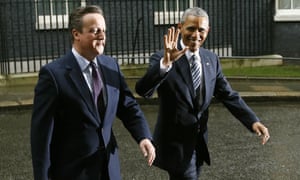The Guardian view on a key week in the EU debate: Obama sends the right message.

Few things matter more in modern political campaigns than standing. A public figure or a party with standing gets a hearing, and thus potentially gets the public’s vote. One without standing gets neither a hearing nor a vote. If your political opponent possesses standing, by contrast, the other side’s most urgent task is to undermine it.
That, in essence, is what the Leave campaign is constantly trying to do to those who make the argument for Britain to remain in the European Union. By and large, the Remain campaign has more institutional and individual standing than Leave, as it proved so powerfully on Friday when Barack Obama joined the argument. That’s why Leavers try to pull their opponents down, increasingly dismissing Remainers as hypocrites, scare merchants, peddlers of special interests or out of touch, while the substance of what they say is all too often waved away. True, Remainers are not always averse to similar tactics themselves at times, but the tendency to kick the player not the ball is more routinised on the Leave side. There has been far too much of this approach this week.
It has been an important week for the Remain cause. In what was clearly a coordinated push, with two months to go before polling day on 23 June, the pro-EU side has played two big cards – economic uncertainty and geopolitical instability – in the same week. On Monday this took the form of the Treasury’s 180-page analysis of the economic impact of leaving the EU, a wide-ranging exercise that boiled down to the claim that every household will be worse off by £4,300 from leaving the EU and which was immediately dismissed by Leavers as merely a project fear exercise and as treating voters like children. But there isalready some evidence that this figure has cut through with the public, for good reason.
In the second half of the week, the focus has shifted to global stability. First, eight former US treasury secretaries weighed in to warn that Brexit represents a critical threat to the global economy. Plenty of home-grown economists also agree. Now, Mr Obama has lent his weight in probably his last visit as president, determined to make a strong appeal for Britain to remain part of Europe. So the Leave campaign has tried its best to knock away Mr Obama’s standing too, first challenging his right to express a view and then accusing him of “downright hypocrisy” for wanting Britain to stay in the EU, a position the US has held for decades.
The Leave campaign’s big problem with pinning any charge on Mr Obama is partly that both he and his country have standing to spare. Mr Obama has not been the White House’s most assiduously pro-European occupant for the last eight years, so his standing here may be lower now than it was when he succeeded George W Bush. But he and his office are both hugely respected, and under this president there is ample evidence that the US has been more internationally minded on issues from Cuba to climate change. Mr Obama made sure on his arrival that he cemented his own standing here by arguing in a Daily Telegraph article that America’s sacrifices for Europe in two world wars gave him the authority to make his case, which it is hard to dispute.
On Friday evening Mr Obama went further, appearing alongside David Cameron (who himself has more standing than some might assume) to hammer home the message that America and its partners want Britain to remain fully engaged in multilateral alliances and that British membership of the EU remains central to their stability. The scale and seriousness of the issues that Mr Obama addressed was in compelling contrast to the superficiality and pettiness of Friday’s criticisms of his visit and his views.
It would be reckless indeed to claim that this week has been a turning point in the Brexit debate. Nevertheless, there has been a small but consistent shift towards Remain in recent opinion polls, even before this week, and some well-placed judges, like the strategist Lynton Crosby, think the mood is moving towards Remain as polling day draws nearer. The bookies and political forecasterscertainly believe as much. A great deal can happen before June and there is much anecdotal evidence in favour of strong Leave support too. Yet if the argument in favour of staying in the EU is beginning to gain traction with the voters, this can only be in the interests of international cooperation to solve international problems. Especially in a week when the nations signed the Paris climate change treaty, this is a mood that should now be driven forward in every way.
The Guardian view on a key week in the EU debate: Obama sends the right message.
![The Guardian view on a key week in the EU debate: Obama sends the right message.]() Reviewed by Unknown
on
11:22:00
Rating:
Reviewed by Unknown
on
11:22:00
Rating:
No comments: